When you’re one of L.A.’s busiest and most versatile stage, TV, and film actors, it’s only a matter of time before StageSceneLA requests an interview, and Rob Nagle is indeed such an actor. With the Scenie winner about to re-open in a remounting of Sam Wolfson’s newly revised Play Dates, it seemed absolutely the right time to ask Rob the questions we’ve been dying to ask since first discovering this Jack-Of-All-Roles several years back. Here’s our long-awaited interview, and for a glimpse at Rob’s impressive résumé, scan down to the bottom of the page.
Hi Rob. In the words of Julie Andrews as Maria von Trapp, let’s start at the very beginning … with a quick biographical sketch starting with your birthplace.
I was born in Eugene, Oregon, but my family moved to DeKalb, Illinois, when I was five. At the age of thirteen, we moved to Williamsburg, Virginia, where I lived until I headed back to Illinois for college.
So how and when did the acting bug first bite?
I was very shy when I was a kid. I guess I always felt safer in my older brother Dave’s shadow. But when I was nine, I started a job as a paperboy, and I couldn’t pick up the phone to call the Chicago Tribune circulation department for when I was short a paper. My mom used to write out a script for me because I was so afraid of the phone. I’d beg her to make the call for me, but she and my dad forced me to find the courage. I think the script helped. Well, around about the same time, I discovered that I could make people laugh. And by the time I was ten, I was at my first audition.
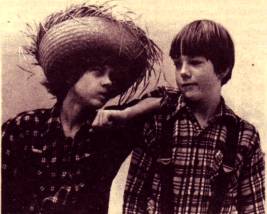
Jeff Smith as Huckleberry Finn and Rob as Tom Sawyer
What was it for?
For a production of Puccini’s Gianni Schicchi with the Northern Illinois University Opera Workshop. With two lines to sing and a single dressing room for the co-ed cast, I was hooked. A year later, I was playing Tom Sawyer in a 1,400 seat theater. So I guess I was lucky. I knew what I was going to do with my life by the time I was ten.
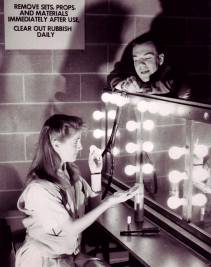
With Kirsten Nelson in The Real Inspector Hound at Northwestern University
You got your post high school education at Northwestern University as did Richard Benjamin, Zach Braff, Nancy Dussault, Charlton Heston, Jennifer Jones, Cloris Leachman, Paul Lynde, Garry Marshall, Megan Mullally, Dermot Mulroney … and that’s just a handful from the first half of the alphabet. So my question is, how much of an actor’s tool (no pun intended) is learned, and how much is just plain natural talent?
I think you can certainly learn technique, and of course can improve immensely with study. That is essential to any craft. But I think much of an actor’s ability is innate. For the same reasons that you can’t really teach someone to have brilliant comic timing. They either have it or they don’t. And if the bulk of talent was a learned ability, how do we explain Mozart’s ability to not only play two different instruments but also compose by the time he was five years old? Everyone has gifts. I believe the trick is discovering them and then improving on the innate.
What were you up to between graduation and your arrival in Los Angeles?
After graduating from Northwestern, I spent three years rattling around the Chicago theater scene.
What was it like for you being a part of that?
I remember loving the arts community in Chicago. It’s a great place to cut your teeth.
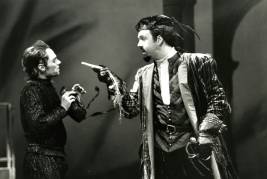
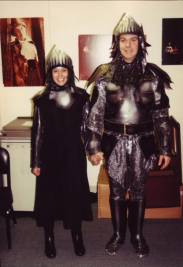
With Wallace Acton in Volpone, and in costume with wife Heather Allyn in All’s Well That Ends Well at the Shakespeare Theatre in Washington, DC.
And after Chicago?
Then I headed to New York, where I rattled around for another three years or so, including a season at the Shakespeare Theatre in Washington, DC. That was 1995-1996.
How was New York for you as a young actor?
I remember loving almost every minute of New York. Whether it was double-shifts at the restaurant or being an actor in a playwrights’ collective—we met every week to read new works and explore the text the writers were honing. Though I do remember distinctly a very cold January morning in 1995. It was 6:00 a.m. and I was sitting in front of the Equity building on the sidewalk while the snow was falling, waiting to get an audition appointment for the Pennsylvania Shakespeare Festival, and I realized that I couldn’t feel my toes. And I remember thinking that something was going to have to change. I didn’t want frostbite to be part of my process. The longer I do this, the more I realize it’s a wonder any of us ever work. The odds are so stacked against us.
Was it about then that you decided to make the move to L.A.?
My wife Heather and I came to Los Angeles in early 1997. Just to try it out for a while. We crossed the country in a U-Haul that summer.
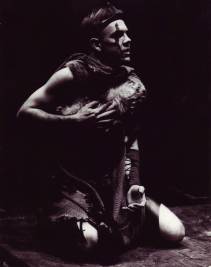
As Macbeth at Northwestern University
Hence your decision to move to warmer climes. You mention the Pennsylvania Shakespeare Festival, which brings up another question. I see from your résumé that you’ve done a lot of Shakespeare. Do you have a favorite role, or one you’re dying to play?
I was fortunate enough to take a stab at Macbeth when I was in college, and that’s one that I’m dying to get back to and try again one day. But I’d better hurry. There’s nothing quite so disconcerting as a great Scottish warrior who requires a cane to cross the moors.
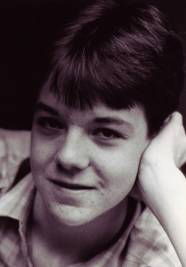
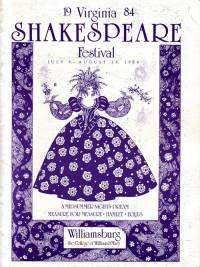
Teenage Rob at the Virginia Shakespeare Festival
Was Shakespeare an acquired taste for you, or one you took to like a duck to the Thames?
For me, Shakespeare wasn’t an acquired taste at all. It was immediate and visceral and thrilling. I interned with the Virginia Shakespeare Festival when I was thirteen, playing a fairy to Joe Mantello’s Oberon in Midsummer. He must’ve been fresh out of North Carolina School of the Arts, and he was magical. At the same time I was working with the professionals, I got involved with a youth Shakespeare program affiliated with the festival. So I started as Aegeon in The Comedy of Errors, and then moved on to Romeo and Petruchio in the following year. It was amazing to explore that language at such a relatively young age.
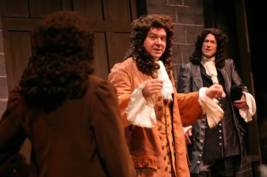
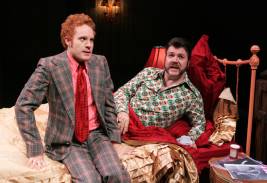
With Dominic Conti Joel Polis in Bach At Leipzig, and with Kasey Mahaffy in Taking Steps
You’re an actor who seems to disappear into every role you play. How much of this is external (hair, costume, accent, etc.) and how much is internal?
I use a variety of methods to get into the roles, and I sort of like to change it up each time. Sometimes it’s a very internal approach, sometimes a very external one. I guess the only common denominator is that I am very instinctive, so I let my gut lead me into each role. Accents certainly take me down a particular path, and help provide lots of clues, the same way speech patterns would. But many times, the characterizations really gel for me once I see myself in the costumes and wigs and facial hair. Once I’m able to look at myself in the mirror, a lot of the choices just fall into place. So I guess in that way, I really rely on the work of the designers.
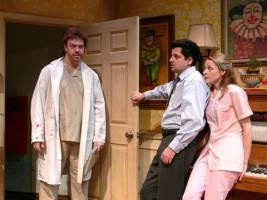
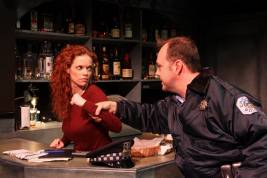
With Jeff Marlow and Katie MacNichol in Where’s Poppa, and with Ann Noble in Sidhe
Are there any well-known acting chameleons whose work you may have admired or patterned your own career after?
As far as chameleons go, there are a handful that I admire immensely. Let me begin with old school and mention the legends: Alec Guinness and Peter Sellers. And then there’s Gary Oldman. Toni Collette. Daniel Day Lewis. Phillip Seymour Hoffman. Guy Pearce. Hank Azaria. And lately, I have to include Johnny Depp. And let me never forget Mark Rylance.
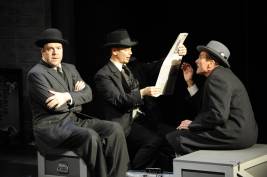
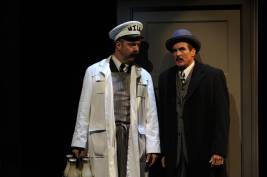
With Larry Paulsen and Sam Gregory (l.) in The 39 Steps, and Sam Gregory (r.)
You recently appeared in Denver in the smash British hit The 39 Steps. How many roles exactly did you play?
Twenty-four roles, with thirty-five costume changes each show. Pretty amazing.
Was this your most challenging project so far?
I think that play is an enormous challenge, particularly for the two clowns, who play nearly fifty roles between them. But it’s also an incredibly fun and fulfilling show to perform. Once everything gets into your muscle memory and you’ve learned the dance that is The 39 Steps, it’s a joy. But they were easily the toughest tech rehearsals I’ve ever encountered. I guess getting any show open is a challenge. There’s never enough time, and yet there always seems to be just enough time. If you have two weeks, it takes two weeks. If you have five weeks, you’ll be just getting it together at the end of the fifth. That’s what’s challenging about every project, but I don’t think I ever see one as more challenging than another, and particularly not when I’m in the midst of them.
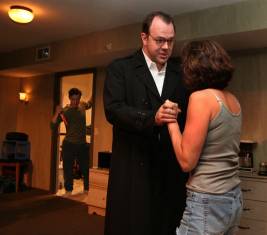
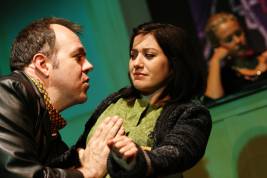
With Andrew Elvis Miller and Amy Landecker in Bug, and with Meredith Bishop and Imelda Corcoran in London’s Scars
You seem to alternate between roles at mid and large-sized Equity theaters like South Coast Rep and the Taper, and 99-seat gigs—in addition to your busy TV/film career. Why not just stick with the jobs that pay well when all you get for doing “Waiver” theater is gas money at best?
And not even that anymore, with the cost of gas so high. You can’t really make a living doing theater—not a decent living, at any rate—unless you find yourself in a long contract, but those are rare. So I don’t think any actors ever really get into the theater (or stay in it) for the money. So I consider my involvement in “waiver” theater as something between outreach and community service. Taking an active part in it is part of my cultural obligation as a member of the theater community. There are so many creative people living and working here, writers and actors and designers and directors and producers. Los Angeles deserves a theater community. And it’s a constant battle to fight the perception that was passed on to me when I arrived and I was told, “Los Angeles is not a theater town.”
You’re that rarity in the professional acting community—an honest-to-goodness working actor with an impressive list of TV and film credits. How tough was it to get to the point where you could make a living from acting gigs?
That’s a constant battle as well. Some years are better than others, some months are better than others. The highs and lows can be very challenging. And they don’t necessarily end once you reach a certain level. Unemployment always comes, and there’s no guarantee that you will ever work, no matter what training or experience or recognition you’ve had. And you’re not entitled to anything. That’s not how it works. It’s not a meritocracy.
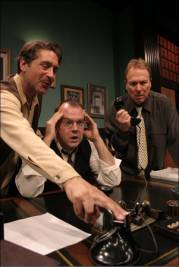
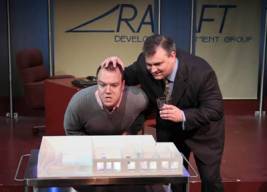
With Kip Gilman as Ben Hecht and Greg Mullavey in Moonlight And Magnolias, and Michael Patrick McGill in Beautiful City
What advice would you give to actors struggling to reach that point in their careers?
Have courage. And be sure that this profession makes you happier than anything else you could possibly do. Constantly reevaluate where you are, making certain that it’s causing you more pleasure than grief. Be prepared for the lean times by saving some money whenever you’re a little flush. Get a job (or a dozen jobs) to pay your bills; don’t live in debt, even though the credit card companies would prefer that you do. Do whatever you’re willing to do, work whatever day job you can stomach, in order to afford you the luxury of pursuing this thing that you love. Mike Nichols warned to beware of the “how am I perceived” virus, a rampant epidemic in Los Angeles. And, perhaps most important, please find a way to be happy when you’re not working. If you can’t do that, you’ll not only drive your friends and family crazy, you’ll drive yourself crazy as well. And your identity will be defined by the approval of others.
You’re about to appear in Sam Wolfson’s Play Dates, a far cry from your recent dramatic roles in London’s Scars and Sidhe. Do you have a preference for either comedic or dramatic roles?
Nope. Whatever’s next. But it’s certainly true that comedy is harder.
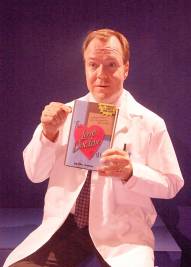
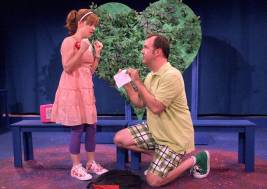
Alone, and with Elizabeth Bond in Play Dates, July 2010
This is a “newly revised” version of the play you performed last July. Without spoiling any surprises, can you tell us what Play Dates is about?
Play Dates is about love. It’s about relationships. It’s about the challenges of finding love and maintaining it. I’ve never understood why so many of us are willing to work hard on our friendships, even when things get difficult, but as soon as our relationships become challenging and require work, we run for the hills. If you expect things to be forever easy in your relationships, then you’re living in a childhood fantasy. All things worthwhile take effort and patience and work. Okay, I think I avoided any spoilers with that answer.
What drew you to the project?
I’ve known the writer Sam Wolfson and the director Jennifer Chambers since college, and I’ve wanted to work with both of them for a long time. A gifted comedic writer and a perceptive, intelligent director helming a project? It’s not hard to do the math.
How does it feel reprising your role six months later, and how “revised” will your role be?
It’s rather strange to be re-rehearsing this show and rediscovering the characters. But it’s been important to all of us to recognize the fact that we’re all six months farther down the line. A lot can happen in half a year, and we’re not the same people we were last summer. So we’re trying to find new truths in our performances, and thus let it be fresh for us as actors, and for our audiences. It’s actually quite fun because it feels very much like a different show this time around.
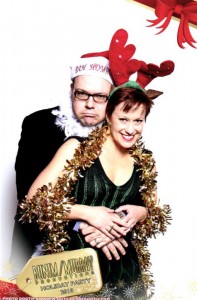

Rob, Heather, and Roosevelt in a festive mood
I love that you ended a recent bio of yours with WIFE: Heather Allyn. PUG: Roosevelt. Care to comment?
Well, those are the loved ones that I go home to after every show. Heather and I have been friends for twenty-one years, and we’ve been together as a couple for sixteen. And despite the fact that we’re both “big dog” people, we have somehow found ourselves the caregivers of a rather headstrong but endlessly entertaining pug.
What’s Rob Nagle’s 5-Year Plan? What would you like to do, what roles would you like to play, how would you like to see your career develop over the next five years?
I’d like to one day spend as much time each week on sets as I do in the theater. But I really love what I do right now. And it’s a much longer than five year plan. I consider what I do as more of a “lifestyle choice” than a career. So I guess I’d have to say that in the next five years I’d like to continue bouncing around between theater, film, television, commercials, workshops and readings, just as I’ve been doing. I’d like to jump from comic material to dramatic material, always trying to find the funny in the serious as well the serious in the funny. I’d like to continue to work on the classics and then turn on a dime to work with a living writer, before turning around to Shakespeare. I’d like to teach more, and to continue coaching actors. I’d like to write more, and to stretch my directing muscles a little more, too. But I never want to stop being an actor. I still find it rewarding, and it’s still fun. Hows about a series regular and some waiver theater while on hiatus? Wait a minute, I came to Los Angeles in hopes of getting to Broadway. So maybe a series regular, a Broadway show … and then back to some waiver theater.
And to that I say, “Why not!” Thanks Rob for taking time out of your busy schedule to chat with us. I can’t wait to be there for the Re-Opening Night of Play Dates!
Thanks so much, Steven. It’s always nice to visit with you. And I can’t wait for you to see the show too!
Television credits include Mad Men, Meet My Mom, Lincoln Heights, Eli Stone, The Middleman, Cold Case, Studio 60 on the Sunset Strip, Without a Trace, Everwood, The Guardian, Buffy the Vampire Slayer, and Dawson’s Creek.
Film credits include Life As We Know It, The Soloist, Inside, Fun with Dick and Jane, Cellular, American Wedding, How High, and A.P.E. #9.
Theatre credits include The 39 Steps (Denver Center Theatre Company), Play Dates (Green Beetle Productions at Elephant Theatre), London’s Scars (Odyssey Theatre); Sidhe (Road Theatre Company) Bach at Leipzig, Moonlight and Magnolias (Odyssey Theatre); The School of Night (Mark Taper Forum); Taking Steps (South Coast Repertory Theatre); James Joyce’s The Dead, Beautiful City, and The Time of Your Life (Open Fist Theatre Company); The Last Days of Judas Iscariot (Black Dahlia Theatre); Bug (Lost Angels); 12 Angry Men, Romance, The Great Tennessee Monkey Trial (L.A. Theatre Works); Where’s Poppa? (Falcon Theatre); Loot (Theatre East); The Voysey Inheritance (Centerstage); Eighteen (Meadows Basement Theater Company – LA Weekly Award Nomination for Leading Male Performance); Love’s Labour’s Lost, The Merry Wives of Windsor, Romeo & Juliet (The Old Globe); Much Ado About Nothing (Shakespeare Festival/LA); Ctrl+Alt+Del (San Jose Repertory Theatre); Angry (Black Dahlia Theatre); Lovers and Executioners (Connecticut Repertory Theatre); Schadenfreude (Circle X Theatre Company). Rob also spent a season at the Shakespeare Theatre in Washington, DC, performing in productions of Macbeth, Henry V, All’s Well that Ends Well, Volpone, and Measure for Measure. He is a member of Pacific Stages and the Antaeus Theatre Company.
Click here for tickets to Play Dates—starting previews January 27 at Theatre Asylum.
Find out more about Play Dates at:
www.greenbeetleproductions.com
Photo credits: Kurt Boetcher, Henry DiRocco, Stephanie Girard, Chris Goss, Enci, Thomas Lascher, Maia Rosenfeld, Terry Shapiro …

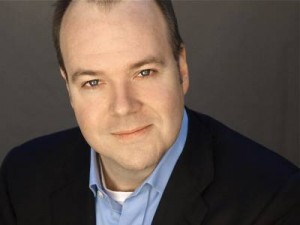
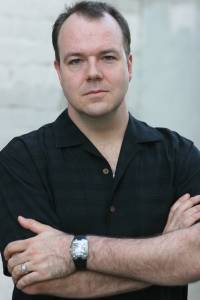

 Since 2007, Steven Stanley's StageSceneLA.com has spotlighted the best in Southern California theater via reviews, interviews, and its annual StageSceneLA Scenies.
Since 2007, Steven Stanley's StageSceneLA.com has spotlighted the best in Southern California theater via reviews, interviews, and its annual StageSceneLA Scenies.







 COPYRIGHT 2025 STEVEN STANLEY :: DESIGN BY
COPYRIGHT 2025 STEVEN STANLEY :: DESIGN BY